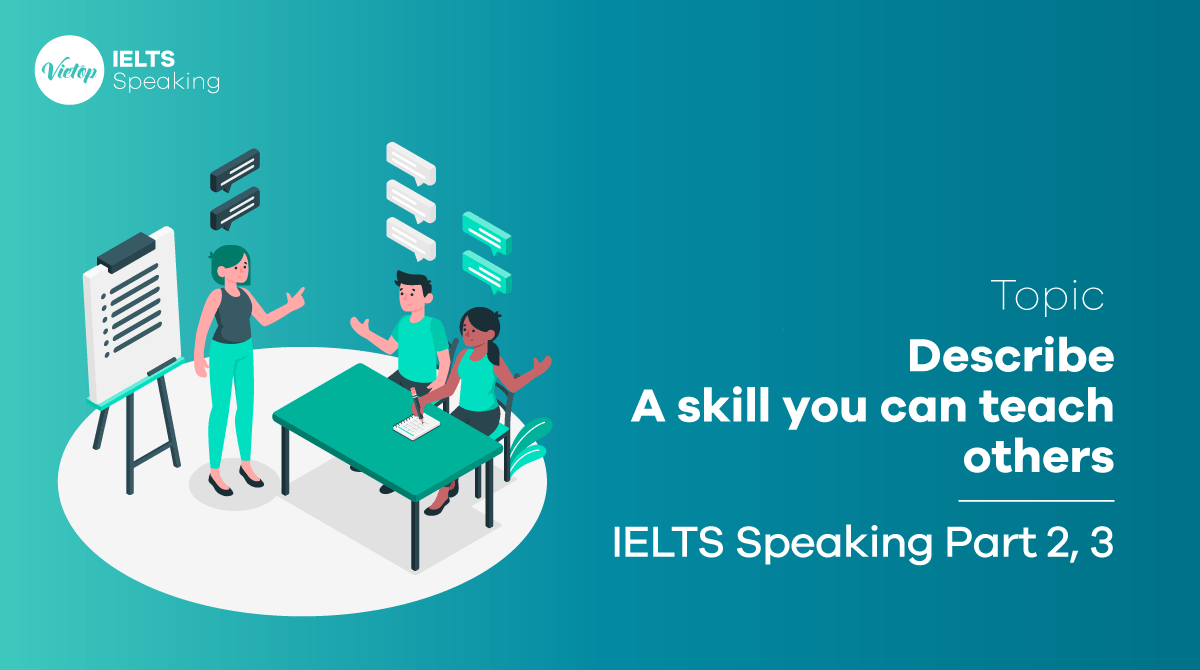Hôm nay, IELTS Vietop giới thiệu bài mẫu câu trả lời IELTS Speaking Part 2, 3: Describe a skill you can teach others. Đề bài này yêu cầu bạn phải kể lại một trải nghiệm, do đó chúng ta nên chú ý canh chuẩn thời gian khi nói để không bị quá dài dòng nhé!
Đề bài Describe a skill you can teach others
Trước hết, bạn có thể gặp đề bài xoay quanh việc kể lại một lần mà ai đó xin lỗi bạn như sau:

| Describe a skill you can teach others. You should say: What is it? How did you learn it? How can you teach others this skill? How do you feel about this skill? |
Xem ngay: Cách phát âm ed trong tiếng Anh chuẩn nhất

Nhận tư vấn miễn phí khóa học hè
Từ vựng Describe a skill you can teach others
Dưới đây là một số từ vựng hữu ích mà bạn có thể sử dụng trong phần IELTS Speaking Part 2, 3: Describe a skill you can teach others.
- Acquire [v.] – đạt được, giành được
E.g.: “I hope to help my students acquire new skills and knowledge in cooking.”
- Adapt [v.] – thích nghi
E.g.: “When teaching digital marketing, it’s important to adapt to the latest trends and changes.”
- Analyze [v.] – phân tích
E.g.: “When cooking, it’s important to analyze the recipe and understand the steps before starting.”
- Collaborate [v.] – hợp tác
E.g.: “Group work allows students to collaborate and learn from each other.”
- Compose [v.] – soạn thảo
E.g.: “When teaching writing, I encourage my students to compose their own stories and essays.”
- Construct [v.] – xây dựng
E.g.: “Students can learn valuable problem-solving skills by constructing their own projects.”
- Create [v.] – tạo ra
E.g.: “Cooking can be a fun and creative activity that allows you to create delicious meals.”
- Critique [v.] – phê bình, đánh giá
E.g.: “When teaching art, it’s important to critique your students’ work and provide constructive feedback.”
- Demonstrate [v.] – trình bày, minh họa
E.g.: “When teaching a new skill, it’s helpful to demonstrate the steps and provide examples.”
- Develop [v.] – phát triển:
E.g.: “By teaching digital marketing, I hope to help my students develop their skills and succeed in their careers.”
- Experiment [v.] – thử nghiệm
E.g.: “Cooking allows you to experiment with different flavours and ingredients to create your own unique dishes.”
- Foster [v.] – nuôi dưỡng
E.g.: “Supporting creativity and innovation can foster a culture of innovative ideas and contribute to the growth of society.”
- Implement [v.] – thực thi
E.g.: “To achieve success in digital marketing, it’s important to implement effective strategies and tactics.”
- Incorporate [v.] – kết hợp
E.g.: “Incorporating multimedia such as videos and images can make lessons more engaging and effective.”
- Innovate [v.] – đổi mới
E.g.: “By fostering a culture of innovation, students can develop their skills and contribute to the growth of the economy.”
- Integrate [v.] – tích hợp
E.g.: “Incorporating real-life examples can make lessons more relevant and practical, and can help students to integrate what they’ve learned.”
- Modify [v.] – sửa đổi
E.g.: “When cooking, it’s okay to modify a recipe to suit your own taste preferences.”
- Nurture [v.] – nuôi dưỡng
E.g.: “Teaching cooking can help to nurture a love of food and healthy eating habits in your students.”
- Plan [v.] – lập kế hoạch
E.g.: “When teaching digital marketing, it’s important to plan your lessons and set clear goals for your students.”
- Practice [v.] – luyện tập
E.g.: “By practicing cooking, you can improve your skills and create delicious meals with confidence.”
- Reinforce [v.] – củng cố
E.g.: “Using visual aids can reinforce concepts and help students to remember what they’ve learned.”
- Research [v.] – nghiên cứu
E.g.: “When teaching a skill, it’s important to research the latest trends and best practices.”
- Solve [v.] – giải quyết
E.g.: “By teaching problem-solving skills, students can learn how to solve challenges and overcome obstacles.”
- Stimulate [v.] – kích thích
E.g.: “Interactive activities can stimulate students’ minds and make learning more engaging.”
- Teach [v.] – giảng dạy
E.g.: “Teaching is the process of sharing knowledge and skills with others.”
- Test [v.] – thử nghiệm
E.g.: “When cooking, it’s important to test your food for seasoning and doneness before serving.”
- Understand [v.] – hiểu
E.g.: “To teach a skill effectively, you must first understand it yourself.”
- Use [v.] – sử dụng
E.g.: “When teaching a skill, it’s important to use a variety of techniques to keep students engaged and interested.”
- Value [v.] – đánh giá cao
E.g.: “By teaching a valuable skill, you can help your students to appreciate and value their own abilities.”
- Work [v.] – làm việc
E.g.: “Group work allows students to work together and learn from each other’s strengths and weaknesses.”
Xem thêm:
Bài mẫu IELTS Speaking Part 2: Describe a skill you can teach others

Gợi ý các bước thực hiện dàn bài Describe a skill you can teach others
- Hiểu câu hỏi: Đọc kỹ chủ đề và đảm bảo bạn hiểu những gì đề yêu cầu. Trong trường hợp này, bạn được yêu cầu mô tả một kỹ năng mà bạn giỏi và có thể dạy cho người khác.
- Chọn một kỹ năng: Hãy nghĩ về một kỹ năng mà bạn tự tin và có kinh nghiệm dạy cho người khác. Có thể là kĩ năng nấu ăn, chơi nhạc cụ, hoặc một môn học cụ thể.
- Brainstorm (động não): Kể ra những khía cạnh của kỹ năng bạn muốn dạy, ví dụ như: các bước hoặc nguyên tắc cơ bản mà ai đó cần biết để thành thạo kỹ năng đó là gì? Một số sai lầm phổ biến mà mọi người mắc phải là gì và làm thế nào để tránh được chúng? Một số mẹo hoặc thủ thuật hữu ích bạn đã học được là gì?
- Sắp xếp các ý tưởng: Hãy sắp xếp các ý tưởng của bạn theo thứ tự hợp lý. Với chủ đề mô tả một kỹ năng, bạn có thể bắt đầu với những điều cơ bản rồi đến nâng cao hơn hoặc tập trung vào những lỗi phổ biến và cách tránh chúng.
- Thực hành trả lời: Cuối cùng, hãy thực hành nói với câu trả lời của bạn, sử dụng những từ vựng, cấu trúc câu mà bạn tự tin và thoải mái để có thể nói trôi chảy, đồng thời ghi nhận lại các lỗi sai để cải thiện.
Xem thêm bài mẫu Speaking:
- Talk about your hometown – IELTS Speaking part 1, 2, 3
- Talk about an English speaking country – Bài mẫu IELTS Speaking part 2, part 3
- Talk about your favorite sport – Bài mẫu IELTS Speaking part 1, 2, 3
Gợi ý dàn bài Describe a skill you can teach others
Mở bài – giới thiệu
Ở phần mở đầu, bạn có thể giới thiệu ngắn gọn về kỹ năng và lý do tại sao bạn nghĩ ta cần học kỹ năng đó. Chú ý tránh việc “mở bài” dài dòng như trong văn viết vì ta chỉ có khoảng 2 phút để nói trong IELTS Speaking Part 2 mà thôi.
Thân bài – mô tả
Mô tả, kể lại câu chuyện theo hướng dẫn của phần “you should say”:
- Kỹ năng đó là gì?
- Bạn đã học nó bằng cách nào?
- Làm thế nào bạn có thể dạy người khác kỹ năng này?
- Bạn cảm thấy thế nào về kỹ năng này?
Bạn có thể cho ví dụ về lợi ích hoặc sản phẩm có thể được tạo ra bằng kỹ năng này.
Kết bài – tóm lược lại
Với phần kết thúc, hãy tóm lược lại mọi thứ trong 1, 2 câu ngắn ngọn. Bạn có thể bỏ qua phần này nếu không đủ thời gian. Nhưng hãy chú ý truyền tải toàn bộ ý tưởng đầy đủ theo yêu cầu đề bài.
Mời bạn cùng nghe Podcast bài mẫu Part 2 của IELTS Vietop nhé:
Bài mẫu Describe a skill you can teach others
Today, I would like to talk about a skill that I am confident in teaching: cooking. I believe that cooking is an essential life skill that everyone should learn, as it not only helps us to eat healthier but can also be a fun and creative activity.
I learned how to cook from my mother and grandmother. Since I was very young, they taught me how to cook traditional dishes from our culture and I’ve continued to learn and experiment with new recipes over the years.
To teach someone how to cook, I would start by explaining the basic cooking techniques such as chopping, sautéing, boiling, and baking. I would then show them how to follow a recipe and how to adjust it to their own taste. I would also teach them how to select ingredients, how to store food properly, and how to plan a menu.
One of the best ways to teach someone how to cook is by cooking together. I would invite them to my kitchen and we would prepare a meal together, step by step. This would give them a hands-on experience and they would be able to ask questions and get feedback in real time.
I feel very passionate about teaching cooking because it’s a skill that can bring people together and create memories. I find it very rewarding to see my students gain confidence in the kitchen and enjoy the food that they’ve created.
- Essential (adj): quan trọng
- Healthier (adj): khỏe mạnh hơn
- Traditional (adj): truyền thống
- Recipe (n): công thức (nấu ăn)
- To chop (v): chặt (thịt)
- To sauté (v): áp chảo (món ăn)
- To adjust (v): điều chỉnh
- Ingredient (n): nguyên liệu (nấu ăn)
- To store (v): lưu trữ (thức ăn)
- Step by step: từng bước một
- A hands-on experience: kinh nghiệm có được do tự thực hành
- Feedback (n): phản hồi
- Passionate (adj): đam mê
- Rewarding (adj): đền đáp
Xem thêm:
Bài mẫu IELTS Speaking Part 3: Describe a skill you can teach others
Với các follow-up questions cho đề “Describe a skill you can teach others”, bạn có thể sẽ gặp những câu hỏi sau:
Mời bạn cùng nghe Podcast bài mẫu Part 3 của IELTS Vietop nhé:
Why cooking is an essential life skill?
Knowing how to cook is important because it allows us to control what we eat, saves money, brings people together, and provides useful life skills for emergency situations and travelling. I would say, it can improve our health, well-being, and quality of life.
- To control (v): kiểm soát
- Emergency (adj): khẩn cấp
- Well-being (n): hạnh phúc
- Quality of life (n): chất lượng cuộc sống
Are skills in the past more difficult to learn than today’s skills?
I would say that it’s hard to compare skills from the past with those of today because they are often very different. Some skills from the past may be more difficult to learn, such as blacksmithing or weaving because they require specialized knowledge and equipment that is not commonly used today. However, modern skills such as coding or digital marketing may be more difficult because they require a high level of technical expertise and are constantly evolving. I think the difficulty of learning a skill depends on the individual, their background, and the resources available to them.
- Blacksmithing (n): rèn
- Weaving (n): dệt
- Equipment (n): dụng cụ, công cụ
- Coding (n): mã hóa
- Digital marketing (n): tiếp thị kỹ thuật số
- Expertise (n): chuyên môn
- Constantly (adj): liên tục
- To evolve (v): phát triển
- Resource (n): nguồn
What do you think should change about the way students are taught in Vietnam?
In my opinion, there should be a greater focus on critical thinking, problem-solving skills, and creativity. Rote learning and memorization may not be as effective as practical learning, which provides valuable experience and real-world application. Supporting creativity and innovation can foster a culture of innovative ideas and contribute to the growth of the economy and society. It’s important for educators, policymakers, and parents to work together to create a supportive and engaging learning environment that will benefit students and the country as a whole.
- Critical thinking (n): tư duy phản biện
- Problem-solving (n): giải quyết vấn đề
- Rote learning (n): học thuộc lòng
- Memorization (n): ghi nhớ
- Practical learning (n): học qua thực hành
- Real-world (n): thế giới thực
- Application (n): áp dụng
- Innovation (n): đổi mới
- To foster (v): nuôi dưỡng
- Innovative (adj): sáng tạo
- Policymakers (n): các nhà hoạch định chính sách
Xem ngay: Khoá học IELTS Cam kết 7.0+ đầu ra – Tăng ngay 1.0 band score IELTS chỉ sau 12 buổi học.
How can a teacher make lessons more interesting?
Teachers can use a variety of techniques such as incorporating interactive activities, group work, multimedia, and real-life examples. Interactive activities such as quizzes, games, and role-playing can engage students and make learning more fun. Group work allows students to collaborate and learn from each other, while multimedia such as videos and images can provide visual aids to reinforce concepts. Real-life examples can make lessons more relevant and practical and can help students to see the value of what they are learning. I would say that teachers are required to be creative and adaptable in their approach to teaching and to be sensitive to the needs and interests of their students.
- Incorporate (v): kết hợp
- Interactive (adj): tương tác
- Multimedia (n): đa phương tiện
- To collaborate (v): hợp tác
- Visual aids (n): minh họa trực quan
- To reinforce (v): củng cố
- Concept (n): ý tưởng
- Relevant (adj): liên quan
- To be required (v): được yêu cầu
- Adaptable (adj): thích nghi
- Sensitive (adj): nhạy cảm, chú ý kỹ đến
Trên đây là bài mẫu IELTS Speaking Part 2, 3: Describe a skill you can teach others, hy vọng bài viết sẽ là nguồn tham khảo tốt cho các bạn trong việc học và chuẩn bị cho kỳ thi IELTS. Chúc các bạn học tốt!











